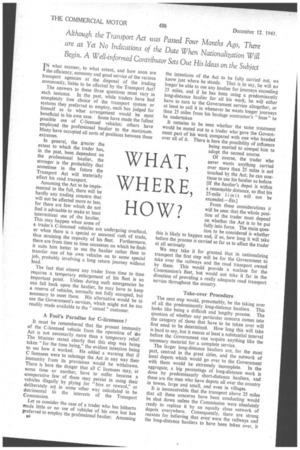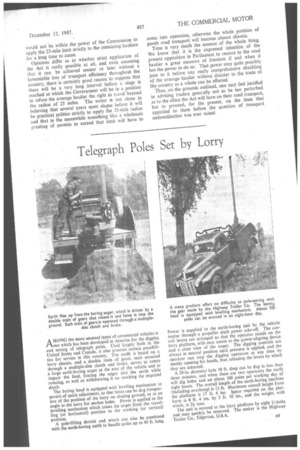WHAT, WHERE, HOW?
Page 38

Page 39

If you've noticed an error in this article please click here to report it so we can fix it.
Although the Transport Act was Passed Four Months Ago, There are as Yet No Indications of the Date When Nationalization Will Begin. A Well-informed Contributor Sets Out His ideas on the Subject
IN what manner, to what extent, and how soon are I the efficiency, economy and good service of the various transport agencies at the disposal of the trading community, liable to be affected by the Transport Act?
The answers to these three questions must vary in each instance. In the past, while traders have had completely free choice of the transport system or systems they preferred to employ, each has judged for himself as to what arrangement would be most beneficial in his own case. Some have made the fullest possible use of C-licensed vehicles; others have employed the professional haulier to the maximum. Many have occupied all sorts of positions between these extremes.
In general, the greater the extent to which the trader has, in the past, been dependent on the professional haulier, the stronger is the probability that sometime in the future the Transport Act will materially affect his road transport.
Assuming the Act to be implemented to the full, there will be hardly any trading concern that will not be affected more or less, for there are few which do not find it advisable to make at least intermittent use of the haulier. This may happen when some of a trader's C-licensed vehicles are undergoing overhaul, or when there is a special or seasonal rush of trade, thus straining the capacity of his fleet. Furthermore, there are from time to time occasions on which he finds it suits him better to use the haulier rather than to transfer one of his own • vehicles on to some special job, probably involving a long return journey without load.
The fact that almost any trader from time to time requires a temporary enlargement of his fleet is an important point. Unless during such emergencies he can fail back upon the haulier, he may have to keep a reserve of vehicles, normally not fully occupied, but necessary to meet them. His alternative would be to use the Government's services, which might not be too readily made available to the " casual " customer.
A Fool's Paradise for C-licensees ?
It must be remembered that the present immunity of the C-licensed vehicle from the operation of tie Act is not necessarily more than a temporary relief. The Minister stated clearly that this step was being taken "for the time being," the evident intention being to see how it worked. He added a warning that if C licensees were to sabotage the Act in any way their immunity from its provisions would be withdrawn. There is here the danger that all C licensees may, at some time or another, have to suffer because a comparative few of them may persist in using their vehicles illegally by plying for "hire or reward," or deliberately act in some other way calculated to be detrimental to the interests of the Transport Commission.
Let us consider the case of a trader who has hitherto made little or no use of vehicles of his own but has preferred to employ the professional haulier. Assuming tyl the intentions of the Act to be fully carried out, we know just where he stands. That is to say, he will no longer be able to use any haulier for journeys exceeding 25 miles, and if he has been using a predominantly long-distance haulier for all his work, he will either have to turn to the Government service altogether, or at least to call it in whenever he wants longer journeys than 25 miles from his haulage contractor's " base " to be undertaken It remains to be seen whether the same treatment would be meted out to a trader who gave the Government part of his work compared with one who handed over all of it. There is here the possibility of influence being exerted to compel him to adopt the second course.
Of course, the trader who never wants anything carried over more than 25 miles is not touched by the Act; he can continue to use his haulier as before [If the haulier's depot is within a reasonable distance, so that his 25-mile limit will not be exceeded .—En.] From these considerations it will be seen that the whole position of the trader must depend on whether the Act is to be put fully into force. The main question to be considered is whether this is likely to happen and, if so, how long it will take before the process is carried so far as to affect the trader at all seriously.
We may take it for granted that in nationalizing transport the first step will be for the Government to take over the railways and the road transport owned by them. This would provide a nucleus for the Commission's fleet, but would not take it far in the direction of providing a really adequate road transport service throughout the country.
Take-over Procedure
The next step would, presumably, be the taking over of all the predominantly long-distance hauliers. This looks like being a difficult and lengthy process. The question of whether any particular concern comes into the category of those that have to be taken over will first need to be determined. How long this will take is hard to say, but it means at least a substantial interval before the Government can acquire anything like the necessary material for a complete service.
The larger long-distance hauliers are, for the most part, centred in the great cities, and the network of local depots which would go over to the Government with them would be extremely incomplete. In the aggregate, a big percentage of long-distance work is done by predominantly short-distance hauliers, and these are the men who have depots all over the country in towns, large and small, and even in villages.
It is inconceivable that the transport above 25 miles that all these concerns have been conducting would be shut down unless the Commission were absolutely ready to replace it by an equally close network of depots everywhere. Consequently, there are strong reasons for believing that evens were the railways and the tong-distance hauliers to have been taken over, it
would not be within the power of the Commission to apply the 25-mile limit strictly to the remaining hauliers for a long time to come.
Opinions differ as to whether strict application of the Act is really possible at all, and even assuming that it can be achieved sooner or later without a lamentable loss of transport efficiency throughout the country, there is certainly good reason to suppose that there will be a very long interval before a stage is reached at which the Government will be in a position to refuse the average haulier the right to travel beyond the radius of 25 miles, The writer is not alone in believing that several years must elapse before it will be practical polities strictly to apply the 25-mile radius and that in the meanwhile something like a wholesale granting of permits to exceed that limit will have to come into operation, otherwise the whole position of goods road transport will become almost chaotic.
Time is very much the essence of the whole thing. We know that it is the expressed intention of the present opposition in Parliament to restore to the road haulier a great measure of freedom if and when it has the power to do so. That power may quite possibly pass to it before any really comprehensive shackling of the average haulier without disaster to the trade of the country as a whole can be effected.
Thus, on the grounds outlined, one may feel justified in advising traders generally not to be too perturbed as to the effect the Act will have on their road transport, but to proceed, for the present, on the lines that appealed to them before the question of transport nationalization was ever raised,




















































































